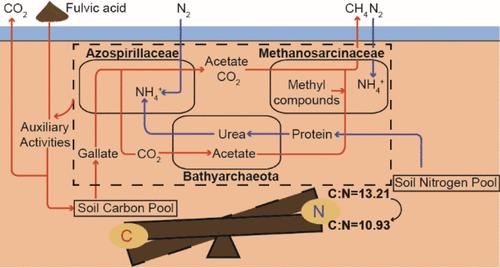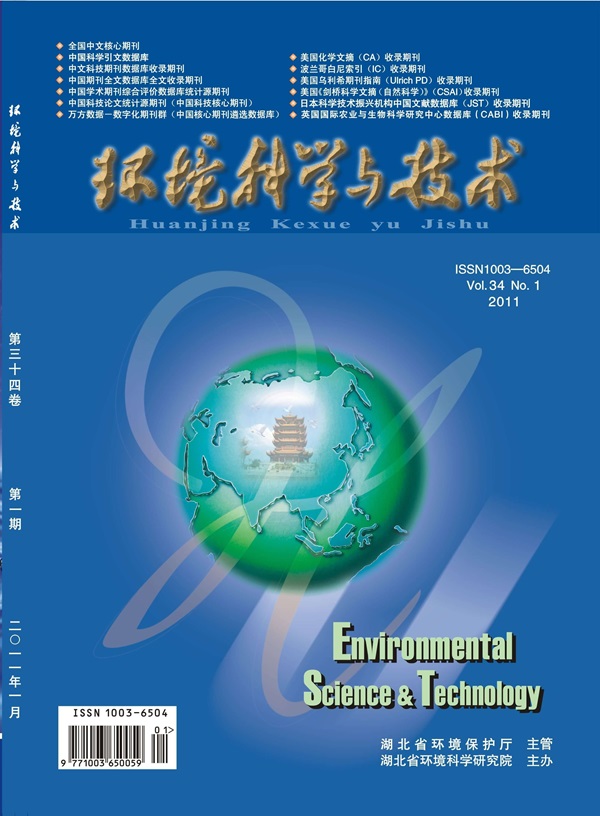Fulvic Acid Enhances Nitrogen Fixation and Retention in Paddy Soils through Microbial-Coupled Carbon and Nitrogen Cycling
IF 10.8
1区 环境科学与生态学
Q1 ENGINEERING, ENVIRONMENTAL
引用次数: 0
Abstract
Fulvic acid, the most soluble and active humic substance, is widely used as an agent to remediate contaminated soils and improve soil fertility. However, the influence of fulvic acid (FA), as a microbial carbon source, on carbon and nitrogen cycles in paddy soils remains elusive. Therefore, to investigate it, an incubation experiment was conducted. Gas analyses indicated that the carbon dioxide and methane emissions were enhanced in FA treatment, which increased up to 94.08-fold and 5.06-fold, respectively. 15N-labeling experiments revealed that nitrogen fixation capability was promoted (1.2-fold) to reduce the carbon and nitrogen imbalance due to fulvic acid amendment. Metagenomic analysis further revealed that gene abundances of degradation of lignin-like compounds, gallate degradation, methanogenesis, nitrogen fixation, and urea hydrolysis increased, while the bacterial ammonia oxidation and anaerobic ammonium oxidation decreased, caused by FA application. Metabolic reconstruction of metagenome-assembled genomes revealed that Azospirillaceae, Methanosarcinaceae, and Bathyarchaeota, with higher abundance in FA treatment, were the key microorganisms to maintain the carbon and nitrogen balance. The metabolic pathways of fulvic acid degradation and coupled nitrogen fixation and retention were constructed. Collectively, our results provided novel insights into the theoretical basis of the use of humic substances for reducing nitrogen fertilization and climate change.

富绿酸通过微生物耦合碳氮循环提高水稻土的固氮和保氮能力
富勒酸是一种可溶性最强、活性最高的腐殖质,被广泛用于修复污染土壤和提高土壤肥力。然而,作为一种微生物碳源,富勒酸(FA)对水稻田土壤中碳和氮循环的影响仍然难以捉摸。因此,为了研究这一问题,我们进行了一项培养实验。气体分析表明,FA 处理中二氧化碳和甲烷排放增加,分别增加了 94.08 倍和 5.06 倍。15N 标记实验表明,富勒酸添加剂促进了固氮能力(1.2 倍),从而降低了碳氮比失衡。元基因组分析进一步发现,施用富里酸导致木质素类化合物降解、没食子酸盐降解、甲烷生成、固氮和尿素水解的基因丰度增加,而细菌氨氧化和厌氧铵氧化的基因丰度降低。元基因组组装的代谢重建结果表明,FA处理中丰度较高的Azospirillaceae、Methanosarcinaceae和Bathyarchaeota是维持碳氮平衡的关键微生物。我们还构建了富里酸降解和耦合固氮与保氮的代谢途径。总之,我们的研究结果为利用腐殖质减少氮肥和气候变化提供了新的理论依据。
本文章由计算机程序翻译,如有差异,请以英文原文为准。
求助全文
约1分钟内获得全文
求助全文
来源期刊

环境科学与技术
环境科学-工程:环境
CiteScore
17.50
自引率
9.60%
发文量
12359
审稿时长
2.8 months
期刊介绍:
Environmental Science & Technology (ES&T) is a co-sponsored academic and technical magazine by the Hubei Provincial Environmental Protection Bureau and the Hubei Provincial Academy of Environmental Sciences.
Environmental Science & Technology (ES&T) holds the status of Chinese core journals, scientific papers source journals of China, Chinese Science Citation Database source journals, and Chinese Academic Journal Comprehensive Evaluation Database source journals. This publication focuses on the academic field of environmental protection, featuring articles related to environmental protection and technical advancements.
 求助内容:
求助内容: 应助结果提醒方式:
应助结果提醒方式:


